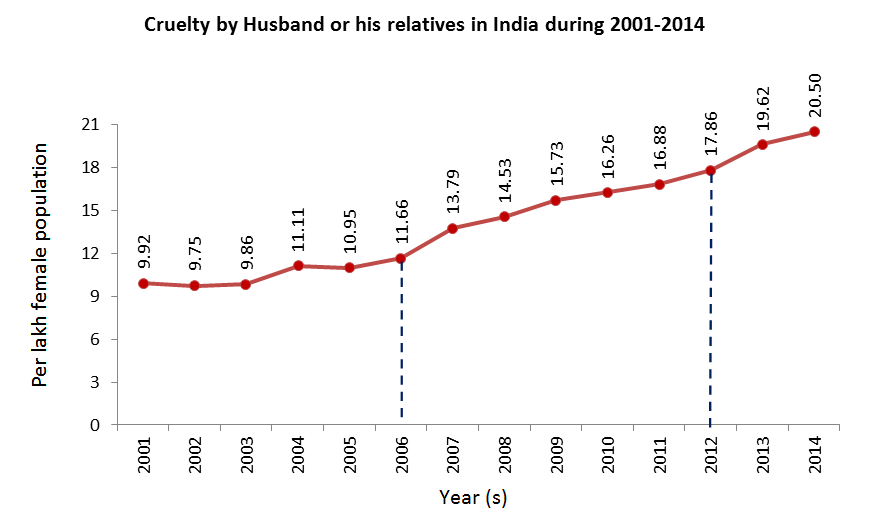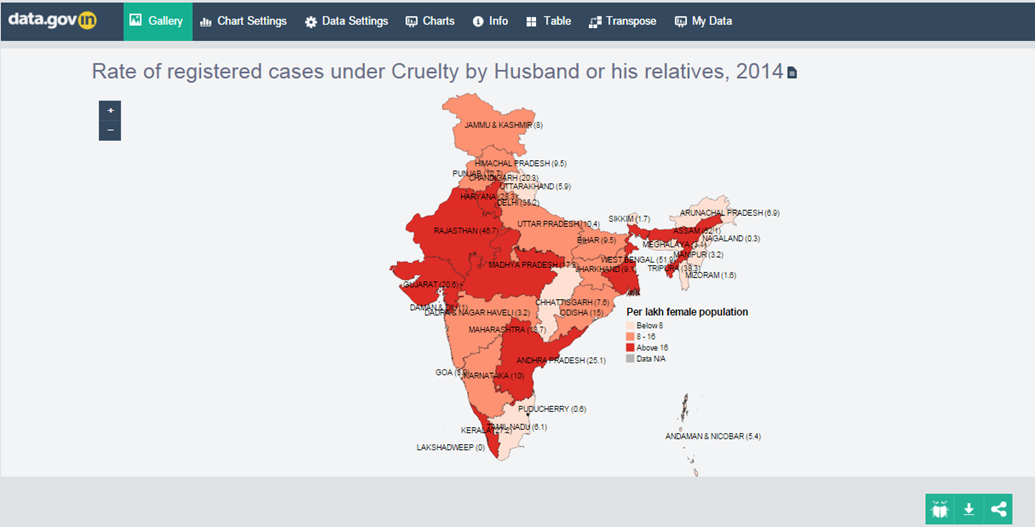 GOVERNMENT
OF INDIA
GOVERNMENT
OF INDIA
 GOVERNMENT
OF INDIA
GOVERNMENT
OF INDIA

Introduction of civil law for protecting women against domestic violence has popularised the older criminal law
The Domestic Violence (DV) Act of 2005 seems to have empowered women in India to come forward and report cases of domestic abuse. Not only are women now coming forward to register complaints under the Domestic Violence Act, but there is a significant increased in the number of criminal cases registered under the Sec 498A of the Indian Penal Code (IPC).
Analysis of National Crime Records Bureau (NCRB) data (also available at data.gov.in) under ‘Cruelty by husband or his relatives’ reported under Sec 498A of the Indian Penal Code (IPC), shows that after the Domestic Violence Act came into force in 2006, there is a steady increase in the number of registered cases under IPC.
DV Act is primarily for prevention, and is a civil act meant to protect the woman. This act does not punish the accused, but a case registered under IPC Section 498A may lead to punishment. A maximum of three years is awarded under Sec 498A and the charge is a cognizable and non-bailable offence. The accused may be granted bail by Courts, but this is a rarity.

Between 2001 and 2006, women reporting on domestic and familial abuse were almost stagnant, but from 2006, after the DV Act came into force, there is a significant increase in the numbers of cases reported under IPC.
Provision under the DV Act encourages a police officer / protection officer / service provider or Magistrate who receives the domestic violence complaint or if is otherwise present at the place of the incident, to inform the aggrieved person of her right to file a complaint under IPC Section 498A.
Even while framing charges, the Magistrate may include this IPC Section.
“Every time a woman files complaints, the officer informs her about Section 498A under IPC. This is one reason why the number of reported cases against cruelty of husband or his relatives has increased,” reveals Rama Nath Jha, Director, Advocacy and Legal Advice Centre (ALAC), Transparency International India.
Even, the constant reporting by media about the woman’s issues including the domestic violence cases has added to the rise in registering cases of abuse.
The Nirbhaya effect on IPC Section 498A
 The 2012 Delhi gang rape case involved a rape and fatal assault. The accused were arrested and charged with sexual assault and murder. The case resulted in a tremendous increase in the public discussion of crimes against women and statistics show that there has been an improvement in the number of women willing to file a crime report. Between 2012 and 2014, the rate of increased reporting on cruelty by husband or his relatives rose from by 15 percent.
The 2012 Delhi gang rape case involved a rape and fatal assault. The accused were arrested and charged with sexual assault and murder. The case resulted in a tremendous increase in the public discussion of crimes against women and statistics show that there has been an improvement in the number of women willing to file a crime report. Between 2012 and 2014, the rate of increased reporting on cruelty by husband or his relatives rose from by 15 percent.
All states in India have shown increased registered cases under Section 498A of IPC.
Total Comments - 0